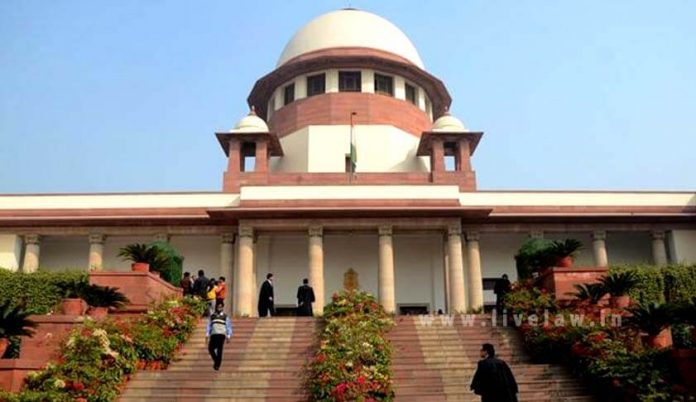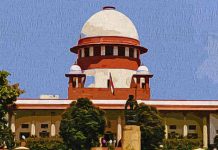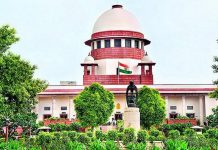This article is written by Revati Magaonkar, from Dayanand College of Law. This article is throwing light on the notable judgments given by ex Justice Indu Malhotra.
Table of Contents
Introduction
Justice Indu Malhotra who has been appreciated as a pioneer in the legal system has done tremendous work in a very short span of 3 years. Justice Malhotra was seated in the position of Judge of the Supreme Court of India on 27 April 2018 and had been there till 2021. She was nominated by Justice Dipak Mishra. Justice Indu Malhotra also has authored the book “The Law and Practice of Arbitration and Conciliation: The Arbitration and Conciliation Act, 1996” co-authored by O. P. Malhotra.
She was among the two women judges at the apex court and the first woman lawyer to be directly promoted to the apex court. She was a practicing advocate in the Supreme Court before being appointed as a Supreme Court judge. Colleagues, as well as senior members of the Bar Council on the last day at the office of Justice Indu Malhotra, described her as an icon and a role model for young lawyers, a judge whose career will leave a long-lasting impact on the judiciary and one of the finest judges of the Supreme Court. The Supreme Court recently bid farewell for one of the few women judges, Indu Malhotra to have graced the court’s bench in recent times. The retirement of Justice Indu Malhotra leaves the only woman judge out of the 29 judges at the apex court.
Background of former Justice Indu Malhotra
Justice Indu Malhotra, the former Supreme Court judge’s journey started after her law degree got completed and she enrolled as an advocate on January 12, 1983, with the Bar Council of Delhi:
- She obtained her Bachelor’s degree in Political Science from Shri Ram College in 1975.
- Masters degree in Political Science from Delhi University in 1977.
- She was appointed as a lecturer of Political Science in Miranda House College, Delhi University.
- She also completed a post-graduate diploma in Corporate laws and the secretarial practice from Indian Law Institute in the year 1978-79. (Obtained her Law degree in 1983)
1988
She qualified for the AIBE (All India Bar Examination) in the year 1988. Her specialization in the law of Arbitration was done and she appeared as a counsel in different domestic and international commercial arbitration. She appeared as a counsel both in India as well as in foreign countries. She also completed the diploma course in International Commercial Arbitration from the chartered institute of arbitrators (CIARB), England. In 1988. She was awarded the Mukesh Goswami Memorial prize for being capped as the Supreme Advocates on Record Examination on National Law Day.
1991-1996
Justice Indu Malhotra had served as the standing counsel for the state of Haryana in the Supreme Court and has also represented several corporations such as the Securities and Exchange Board of India (SEBI), Council for Scientific and Industrial Research (CSIR), Delhi Development Authority (DDR) and also for Indian Council for Agricultural Research (ICAR) before the Supreme Court. She was also appointed as the sole arbitrator for various arbitration institutions.
Justice Indu Malhotra is the second woman to have been elevated to the position of a senior advocate by the Supreme Court in the year 2007 after thirty years. She has been also appointed as the amicus curiae by the various benches of the Supreme Court for some of the matters in her career, and in an earlier period before the retirement, she has been appointed as an amicus curiae for the matter of restoration of the Jaipur as it is the city of heritage.
Important and notable judgments by Justice Indu Malhotra
Navtej Singh Johar v. Union of India
This judgment is one of the historic decisions passed by the Supreme Court of India by decriminalizing gay sex between adults with consent, reading down Section 377 of the Indian Penal Code (IPC). This judgment has been delivered by the bench of former Chief Justice of India consisting of Dipak Mishra, Justice Rohinton Nariman, Justice A M Khanvilkar, Justice D Y Chandrachud, and Justice Indu Malhotra. Here the court held that Section 377 criminalizes the consensual sexual act between the adult human being which is unconstitutional and subject to be struck down. But the court kept the provision of Section 377 of sexual activity with animals as a criminal offense.
The Supreme Court said that every individual has an equal right to liberty and should be respected. Hence the LGBT community also has equal rights under the Constitution. The main objective of the constitution is to transform society progressively, so its provisions should not only be interpreted in only a literal sense. Hence sexual orientation is natural and cannot be discriminated against, as it is a violation of freedom of expression. Justice Indu Malhotra in her separate but concurring opinion held the (Section 377) provision of IPC has violated Article 14, 15, 19, 21 by its collateral effect on the criminalization of consensual sex between the LGBT person.
Ex Justice Indu Malhotra had played an important role in it by her reading, she held that “History owes an apology to the members of this community and their families, for the delay in providing redressal for the ignominy and ostracism that they have suffered through the centuries.”
Indian Young Lawyers Association and Ors. v. State of Kerala and Ors.
In this case, the Supreme Court had held that all women, irrespective of their age, have the equal right to enter the Sabrimala temple of Lord Ayyappa in Kerala. The Constitutional Bench of Chief Justice Dipak Mishra, Justice Rohinton Nariman, Justice A M Khanvilkar, Justice D Y Chandrachud and Justice Indu Malhotra by the majority of 4:1 stuck down the Rule 3(b) of Kerala Hindu Places of Public Worship (Authorisation of entry) Rule entry 1965, which was the basis of barring entry of women between the ages of 10 and 50 years to the Sabarimala temple. The bench has delivered a total of four judgments in respect of their separate readings.
CJI Mishra wrote the judgment on behalf of him and Justice Khanvilkar, Justice Nariman and Justice Chandrachud wrote a concurring judgment each but Justice Indu Malhotra wrote a dissenting opinion. Section 3(b) of 1965 Rules, clearly violates the right of Hindu women to practice religion under Article 25 of the Constitution, and the bar on entry of the women of the above-mentioned age not being an essential part of religion, CJI held it to be ultra vires the 1965 Act under which it was drafted. Justice Nariman also concurred with CJI Mishra that the custom of barring entry of women into the temple violates Article 25(1) of the Constitution of India. Justice Chandrachud also delivered his judgment concurring with the majority. He also gave a broad interpretation of Article 17 of the Constitution which prohibits untouchability.
Justice Malhotra gave her dissenting judgment by stating that the issues brought in this case will also have relevance in the other places of worship too. On the said issue of religious practices, she held that only based on Article 14 of the Constitution they cannot be tested solely.
She held that “What constitutes essential religious practice is for the religious community to decide, not for the Court”.
She stated that notions of rationality cannot be brought into religion and for that, a balance has to be struck between religious beliefs on one hand and the cherished principle of nondiscrimination and equality on the other hand. By disagreeing with the other judges on the Bench Justice Malhotra felt that devotees of Lord Ayyappa certainly formed a different denomination.
Public Interest Foundation v. Union of India
In this case, the court delivered judgment for the Electoral disqualification. The issue before the court was that the persons ought to be disqualified from membership in legislative bodies when criminal charges are framed against them. Section 8 of the Representation of People’s Act only disqualifies the persons when they have been convicted for criminal charges.
This case was decided by a five judges Bench. It decided that it cannot disqualify candidates from contesting elections, against whom criminal charges have been framed. They quoted respect for the separation of powers but they comprehended that they don’t have the power to introduce the new rules for disqualification of electoral candidates for any cause. The bench consisting of CJI Dipak Mishra, Justice Rohinton Nariman, Justice A M Khanvilkar, Justice D Y Chandrachud, and Justice Indu Malhotra, asked the parliament for making laws regarding the prevention of candidates who are accused of crimes serious in nature, from stepping into politics. They also made some suggestions as such laws are necessary for ensuring that voters can make informed choices about whom they are choosing to elect. It concluded that an informed choice is a most important cornerstone of a strong and pure democracy.
Joseph Shine v. Union of India
In this case, the Constitutional Bench of the Supreme Court had unanimously struck down Section 497 of the Indian Penal Code which had penalized Adultery. The Supreme court on 27th September 2018 has struck down the 158 year’s old Victorian morality law on adultery. The growth in the concept of adultery has been discussed thoroughly in this judgment. Joseph, a non-resident of Kerala filed this petition by raising a question on the validity of Section 497 of the Indian Penal Code. It has overruled all the last judgments which upheld the criminalization of adultery. The opinion of the court is that adultery doesn’t fit in the concept of crime. It was said that if it is treated as a crime, there would be a vast intrusion into the extreme privacy of matrimonial life. Hence it has been left as a ground for divorce. Even if it has been legal, it is still not ethical in the eyes of society. Therefore, the Supreme Court of India did not interfere in the private and moral life of people.
Jarnail Singh v. Lachhmi Narayan Gupta and Ors.
This case involves the controversy around the interpretation of the Articles of Constitution of India. Article 16(4A) and (4B) which deals with provisions of reservation in employment, Article 335 claims of scheduled caste and scheduled tribe, etc. The Supreme Court has delivered its verdict in the Reservation in Promotion case. The Bench of five judges unanimously held that the judgment delivered in the case of M.Nagaraj & Others vs Union Of India & Others on 19 October 2006 which was delivered by Bench: Y. K. Sabharwal Chi, K.G.Balakrishnan, S. H. Kapadia, C. K. Thakker, P. K. Balasubramanyan, this case was related to reservations in promotions for SC and ST persons and it doesn’t need reconsideration from a seven-judge Bench. In this case, the Bench also struck the presentation of additional backwardness criterion from the case of Nagaraj.
As it struck down the further criterion it also gave an introduction to the principles of creamy layer exclusion. It further held that creamy layer exclusion extends to SC and SC, so the State still cannot grant reservation in promotion to the persons belonging to SC or ST who relate to the creamy layer of their community. This judgment was authored by Justice Rohinton Nariman.
Rojer Mathew v. South Indian Bank Ltd. and Ors.
In this judgment, the Supreme Court in November 2019, dealt with and decided the constitutionality of Part 14th of the Finance Act, 2017 and the rules formulated thereunder. The Finance Act was one of the unusual pieces of legislation; it was not like the normal annual finance acts which deal with the matters relating to finance of all the Union of India and also seek for obtaining legislative sanctions for the proposals which have been put forth in the Union Budget. In this case, the petitioner had contended that the provision of the Finance Act takes away all the judicial safeguards and makes the tribunals amenable to the notions and ideas of the largest litigant, i.e. the state.
Hence, the Supreme Court here held that the powers delegated to the central government under the Finance Act don’t intend to be vested solely with the legislature for all the time, the purposes, policies, and guidelines exist about the same. In addition, the court held that a mere possibility and eventuality of abuse of delegated powers in absence of any evidence for supporting such a claim cannot become a ground to strike down the provisions of the Act. It also held that the matter is always open for a challenge in a Constitutional Court, made to a delegated legislation which has been framed by executives to examine if it conforms to the parent legislation and the other laws if it has been found the contrary, also for same to be struck down without making any effect on the Constitutionality of the rulemaking power. Hence the court held that Section 184 of the Finance Act is not unconstitutional.
Some other notable judgments of Justice Indu Malhotra
- Rajnesh v. Neha
- Smriti Madan Kansagra v. Perry Kansagra
- Miss XYZ v. the State of Gujarat
- Shatrughna Baben Meshram v. the State of Maharashtra
- Dr. Naresh Kumar Mangla v. Smt. Anita Agarwal and Ors.
- M/S Shriram EPC Ltd. v. Rio glass Solar
- Government of India v. Vedanta Ltd
Conclusion
Ex Justice Indu Malhotra has done tremendous work to be remembered in the legal fraternity, and in her very short span of career being three years she has dealt with the cases very wisely with her perspective. She has given judgments on so many important and big issues such as Sabarimala Temple, Adultery, etc. As a pioneer, she has inspired so many people from the legal field and has left a great career story to get inspired by. In total work period as a Supreme Court judge, she has dealt with 199 judgments and from these, she has authored 75 of these rulings. At the time of retirement, she said that “I leave this court with a sense of fulfillment”. She has been a trailblazer in a profession that suffers from an abject lack of gender discrimination.
References
- https://theprint.in/judiciary/firm-meticulous-justice-indu-malhotra-retires-after-short-sc-stint-of-less-than-3-years/621376/
- https://www.barandbench.com/amp/story/columns/the-verdictum-justice-indu-malhotra
- https://www.barandbench.com/news/sabarimala-women-entry-supreme-court
LawSikho has created a telegram group for exchanging legal knowledge, referrals, and various opportunities. You can click on this link and join:
 Serato DJ Crack 2025Serato DJ PRO Crack
Serato DJ Crack 2025Serato DJ PRO Crack











 Allow notifications
Allow notifications


